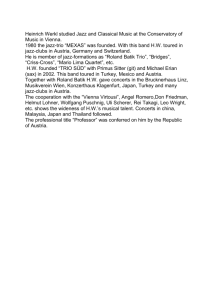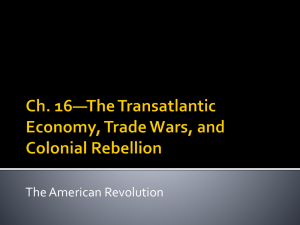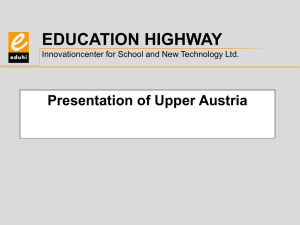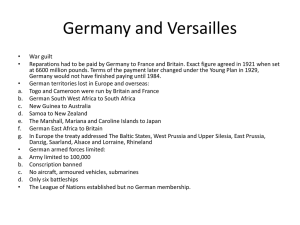Meaghan Tomasiewicz
advertisement
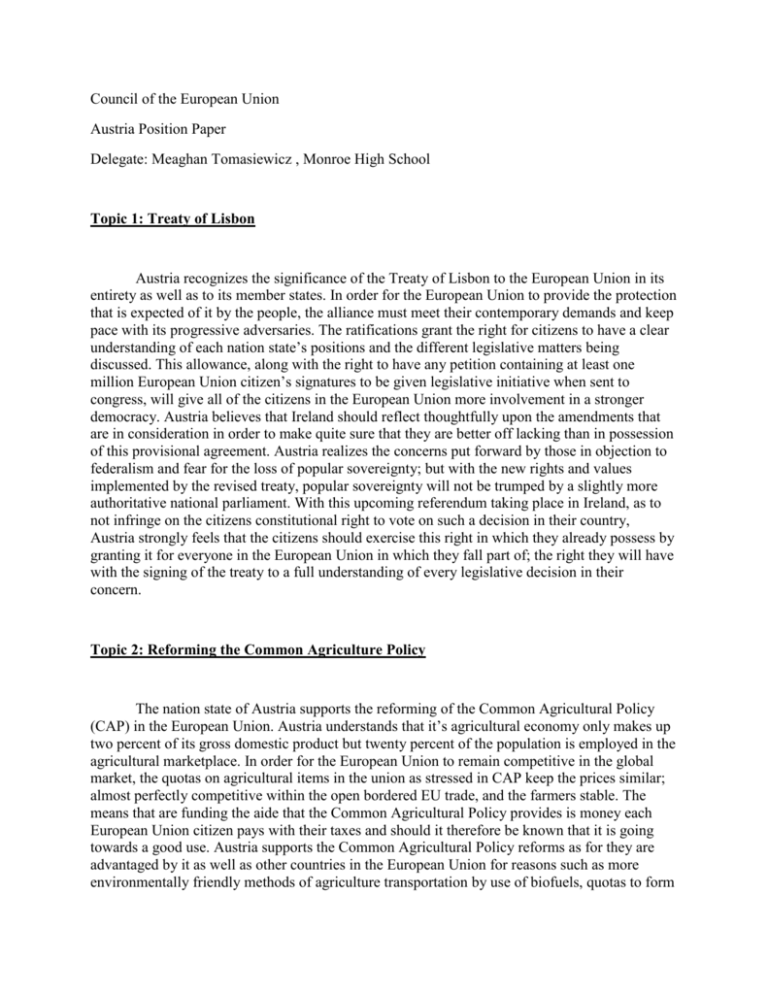
Council of the European Union Austria Position Paper Delegate: Meaghan Tomasiewicz , Monroe High School Topic 1: Treaty of Lisbon Austria recognizes the significance of the Treaty of Lisbon to the European Union in its entirety as well as to its member states. In order for the European Union to provide the protection that is expected of it by the people, the alliance must meet their contemporary demands and keep pace with its progressive adversaries. The ratifications grant the right for citizens to have a clear understanding of each nation state’s positions and the different legislative matters being discussed. This allowance, along with the right to have any petition containing at least one million European Union citizen’s signatures to be given legislative initiative when sent to congress, will give all of the citizens in the European Union more involvement in a stronger democracy. Austria believes that Ireland should reflect thoughtfully upon the amendments that are in consideration in order to make quite sure that they are better off lacking than in possession of this provisional agreement. Austria realizes the concerns put forward by those in objection to federalism and fear for the loss of popular sovereignty; but with the new rights and values implemented by the revised treaty, popular sovereignty will not be trumped by a slightly more authoritative national parliament. With this upcoming referendum taking place in Ireland, as to not infringe on the citizens constitutional right to vote on such a decision in their country, Austria strongly feels that the citizens should exercise this right in which they already possess by granting it for everyone in the European Union in which they fall part of; the right they will have with the signing of the treaty to a full understanding of every legislative decision in their concern. Topic 2: Reforming the Common Agriculture Policy The nation state of Austria supports the reforming of the Common Agricultural Policy (CAP) in the European Union. Austria understands that it’s agricultural economy only makes up two percent of its gross domestic product but twenty percent of the population is employed in the agricultural marketplace. In order for the European Union to remain competitive in the global market, the quotas on agricultural items in the union as stressed in CAP keep the prices similar; almost perfectly competitive within the open bordered EU trade, and the farmers stable. The means that are funding the aide that the Common Agricultural Policy provides is money each European Union citizen pays with their taxes and should it therefore be known that it is going towards a good use. Austria supports the Common Agricultural Policy reforms as for they are advantaged by it as well as other countries in the European Union for reasons such as more environmentally friendly methods of agriculture transportation by use of biofuels, quotas to form a more perfect competition and the newly addressed transparency of bills and transactions for the people. Austria recognizes the many arguments made against certain aspects such as the milk quota being challenged by COCERAL because of the hope for free trade among the union with out state intervention, but is confident that the 2008 Common Agricultural Policy revisions are in the best interest of the European union. Topic 3: The Current Economic Climate of the European Union Although one of the most wealthy and most industrialized affiliates of the European Union, Austria will continue to give strong importance to assisting those nation states that are less prosperous economically. Austria recognizes the issues in which many of the more affluent nations are facing regarding their fiscal situations, and in doing so Austria recommends that nations study the Economic and Social Partnership, the symbiosis of the employers’ associations and the employee’s federations, that has been the roots of their rich economy, as well as maintaining, for the most part, satisfied workers since 1957 when the collaboration developed. Austria encourages the European Union to promote reforms over bailouts in order to avert net recipients of financial support that are not taking responsibility for their debt-- an externality that arises when an absolute upper limit isn’t implemented or a simple bailout is issued but no structural changes are executed. It is understandable, in the way that unemployment in a union without borders can greatly affect each country in the Eurozone, but it should still be understood that the fiscal responsibility lies still with the nation state liable, with the help of the other nations working within the international affinity. Council of the European Union Country: Austria Delegate: Madeline Arnold, Monroe High School Austria believes that the EU must work to ratify and implement the Lisbon Treaty as quickly as possible. We must reform the EU so that it is more efficient, and performs the tasks that it was originally formed to accomplish; namely protecting and economically supporting its member states. The Lisbon Treaty has provisions that promote accountability and transparency in the EU, with Austria deems very important, as do the other twenty-two states that have already ratified the treaty. The Treaty also provides a more democratic and flexible government that will be up to the challenges of the future. The best solution to the issue of ratification may be the adoption of a separate Decision concerning issues that the people of Ireland find important, while retaining the original Treaty. There are multiple other diplomatic options that Austria is willing to consider, however, the most important issue is that the main changes in the Lisbon Treaty be implemented as soon as possible while pleasing as many parties as possible. The Common Agricultural Policy (CAP) is beneficial to the well being of many European farmers, and others as well through the interconnectedness of the European economy. The function of supporting the agricultural industry is vital to the EU. However, the CAP is in need of sweeping reforms. As it is, the policy is unfair to many member states, as well as non-member nations. The benefits are far from proportional to the monetary support of member nations. This program is currently taking an unnecessarily large portion, 45.5%, of the EU budget, which does not correspond to the small percentage that agriculture accounts for in our GDP. This spending is simply not sustainable. Many amendments are necessary to begin the broad changes needed, but the most important matter is to start negotiations now. The global economic crisis brings up many issues that the EU must deal with. Austria believes that although all economies are struggling through these tough times, stronger nations should aid those in need. Bailouts of large corporations and banks are unfortunate but necessary to keep all EU countries afloat. The EU should also promote measures that reduce the unemployment rate and support the euro during the global recession. Preventing the membership of new states is a measure that Austria believes is drastic and undemocratic, and would go against the ideals of the EU.
